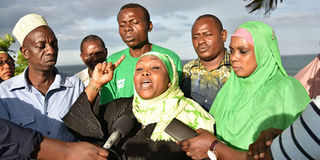Post-vote chaos turned Zaja into a peace ambassador

United Green Movement party leader Hamisa Zaja addresses journalists in Mombasa on June 27, 2018. She is a peace crusader. PHOTO | FILE | NATION MEDIA GROUP
What you need to know:
- She also mobilised women in Tana River to get involved in campaigning for peaceful resolution to conflicts.
- Her group’s efforts, she says, have paid off as incidents of incitement to hatred and violence between the religious groups have reduced.
In a world fraught with the danger of conflict and tragedy, Hamisa Zaja has learnt to be bold in the fight for peace.
Ms Zaja, who lives with a disability, says she will never get tired of fighting for peace and justice.
Life for the human rights activist, peace champion and community leader was not always a smooth ride.
“Having been raised in a devout Muslim family, I always looked at my condition as a challenge to be overcome, and not a magnet for pity,” she says.
Ms Zaja would plait girls in her boarding school in return for their services — fetching water for her.
“In exchange for a well done row of braids, girls in my dorm at Mama Ngina Secondary would fetch water for me. I now serve as a member of the school’s Board of Management,” she says.
Ms Zaja, who runs the Green World Foundation, an NGO dedicated to youth empowerment, peace-building and environmental conservation, realised the importance of peace the hard way.
LYNCHED
In the wake of the violence that broke out in Mombasa after the 2007 General Election, members of the disabled community suffered a lot, recalls the 48-year-old activist.
“One of the women living with disability was caught up in a demonstration that turned ugly after a confrontation with police. She struggled to flee from the chaos and took refuge in a shop whose owners had fled on hearing the commotion,” she says.
By hiding in the shop, the woman, who was deaf and speech-impaired, had unwittingly walked into a trap.
“After the confrontation ended, the residents retreated into their premises only to find her in the shop. They descended on her with kicks and blows, accusing her of being a thief,” says Ms Zaja.
“Because she was a deaf mute and unable to explain herself well in sign language, the angry mob beat her up before setting her on fire,” says Ms Zaja.
PEACE DRIVE
On being informed about the incident, Ms Zaja and other members of the disabled community rushed to her rescue, and pleaded with the crowd to allow her to be taken to hospital.
“She was admitted to Coast General Hospital with 70 per cent … burns. But three days later, she succumbed to her injuries,” says Ms Zaja.
“We lost nine disabled people during that period. It was painful for me, and this awakened a desire to ensure that such injustices never recur,” she tells the Nation.
In 2012, the Coast region was once again gripped by violence following the gunning down of radical clerics. In her rural home, there was conflict between the Orma and Pokomo.
She formed an organisation of disabled people and began holding meetings with residents appealing for peace.
“Together with Sheikh Idriss and other religious leaders, we travelled all over preaching peace and the need to protect [the disabled] in times of conflict.”
AWARD WINNER
She also mobilised women in Tana River to get involved in campaigning for peaceful resolution to conflicts.
“We realised that the disabled, especially women with children, suffer twice. This is because they cannot flee during times of conflict,” says the peace warrior.
“Whenever there is a conflict involving members of both religions in this region, Muslims feel targeted by Christians, and vice versa,” says Ms Zaja.
Her group’s efforts, she says, have paid off as incidents of incitement to hatred and violence between the religious groups have reduced.
Their mission has extended to addressing extrajudicial killings that have created animosity between youth and police in Mombasa. “I have been organising meetings where officers and residents can talk to each other.”
Her efforts have not gone unnoticed. She won the 2011 Pwani Human Rights Award in the Special Ability Person of the Year category.





